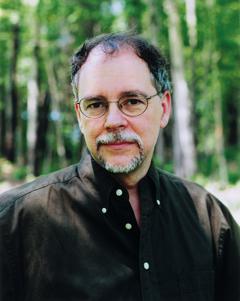
Author Gregory Maguire
Zack Ruskin:When did you decide to take your fourth trip to the Land ofOz? Was there unfinished business from your first three novels set there?Gregory Maguire: When I reached the end of volume two, Son of a Witch, Ithought the two first volumes sat together on the shelf very handsomely. Like,say, Tom Sawyer and Huckleberry Finn, or the original publications about thoseMarch girls, Little Women and Good Wives (which eventually were publishedtogether as the Little Women we know so well today). But it is true that, inorder to lend the fantasy novels in Oz a great sense of verisimilitude—ofgrittiness, of sordor as well as glamour—I had left a lot of plot strandsdangling. Face it, that is how most of our lives are lived, with less thanadequate knowledge about how our friends and enemies, our children and ourparents, actually lived before we came along or will live after we die. Thismeant that the starting material, the yeast as it were of the final two books,were entirely in place when it came time to draft A Lion Among Men and Out of Oz.
Zack Ruskin :The final installment in the Wicked Years is titled Out of Oz. Is there intent on your end to expand the world of the series, or does the“out” refer more to the book’s place as a closing chapter?
Gregory Maguire: I don’t want to give anything away, but I will say that Out of Oz is a title that has many different overtones. For one thing, it hearkensback to an archaic way of talking about the news from a dark and distant land:“What’s the news out of Africa? What’s thenews out of Indochina?” “What’s the news outof the dugout, the PTA High Command,” etc. It also, of course, implies theworld beyond Oz, and that world involves a girl we have met before, namedDorothy. Since Dorothy would make a return visit to Oz, she would have to comethere from “out of Oz,” and that is how the novel opens. Finally, or nearlyfinally, I was happy in coming up on that phrase because all the original Oznovels ended in “of Oz.” Think about it. The Wizard of Oz. The Marvelous Land of Oz. Dorthy and the Wizard of Oz. The Emerald City of Oz. So I liked that affinity, too, of phrases.
Zack Ruskin :From a technical standpoint, with a 519 page book like Out of Oz, when do you know you’ve finished? Does the page count simply reflect howlong it took you to tell the final story, or did you want the last book to havea more substantial impact?
Gregory Maguire: I began the book knowing what the last scene was going to belike—indeed, I wrote a version of the last few pages about 15 years ago, when Idrafted an aborted sequel to Wicked called The Education of Tin and Straw. Butit is true that much of the novel had to be written in order for me tounderstand what it was about. There are a lot of characters to give tendermercies to, and a lot of mysteries to resolve, and I was resolved not to rushit, or it would feel like rushing around the landscape of Oz with a Zamboni,smoothing out bumps without regard to which bumps needed to remain…
Zack Ruskin :What’s the bigger challenge: reducing your story to the fewwords of a children’s book or filling the pages of an adult novel?
Gregory Maguire: I think that writing for children is much harder for thereason you suggest. Indeed, I am not a proficient writer of short stories orpicture books, and while I love poetry I am not compressed, concise enough.Look at how long my answers are to your questions! Still, the best ofchildren’s writing is strong, compact, revelatory. I think of books like Charlotte's Web and Tuck Everlasting, books that don’t have an extra sentence in them. Or stories slimand strong as Horton Hears a Who, Where The Wild Things Are, or Millions of Cats. Those books work as deftly as poetry. I’m in awe of writers who can dothat. (M. B. Goffstein, picture book writer, is one who excels at it. Herlittle books are like haiku.)
Zack Ruskin: What does Oz exemplify to you? What facets of the settingafforded you the chance to set four novels there?
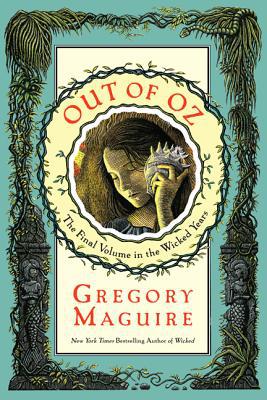
Gregory Maguire: I had always loved the countries of Narnia, Neverland, evenWonderland. I came a bit later to Prydain and to Earthsea and Middle-earth, andliked them too though they were less clear in my mind. What five of the six ofthose countries mentioned above, however, have in common is their essentialBritishness. They were discovered and invented either by Englishmen or by anAmerican in homage to those same books. The one exception is Ursula Le Guin’sEarthsea books, which is more like The Odyssey than anything else.
This is to say, the only truly American magical landscape isOz. When I thought about it (sixteen, eighteen, twenty years ago), I realizedthat Oz had length and breadth and complexity, even in L. Frank Baum’s fairlysimple and comic tales, that matched the ladscape and cultural differences ofthe different parts of our country. I began to see it was a metaphor largeenough for US. Narnia was too small, the Shire in the Tolkien books toocozy-villagey for us. It would take a broad, disassociated landscape to dealwith what we have to deal with in this country, and Oz presented itself for myuse. Luckily, the copyright on Oz had just lapsed when I began…. (I say luckilybecause I knew nothing of copyright law when I began. I just began.)
Zack Ruskin :When you’re working in a setting outside of reality, whatkind of parameters do you set to ensure readers never feel (unintentionally)lost or confused?
Gregory Maguire: I am a great admirer of maps, and I have drawn all the mapsfor my four books myself. (They are beautifully redrawn by Douglas Smith, butevery particular of them, including even how the borders are drawn, how themountains and streets and marshlands are indicated, are my design.) I also, inthe later two books, supply time lines, genealogies, and summaries of recenthistory—a kind of “Our story so far” summary—for those who have been so movedas to read other fiction in the years in between I supply them installments. Isall this extra armature useful? It is hard to say. It is certainly useful tome, because I don’t want to get things wrong. (And in the first two books I didget a few things wrong, and had to bend over backwards to find a way to makethings right.)
Zack Ruskin: Some of your novels take a familiar folk tale or piece ofpopular fiction as their inspiration, but with the Wicked Years, the territoryis more uncharted. As you approached your fourth book in the series, did youstill feel some kind of distant allegiance to L. Frank Baum and his vision?
Gregory Maguire: It is interesting to note that Baum wrote 14 novels aboutOz, and then after his death “sanctioned” authors wrote several dozen more. AsI grew up, only Baum’s first two novels were available in my public library. Iknew there were lots of other books out there, but I couldn’t find them. Ithink in some ways their absence provided me with some of the urgency to findout what Oz was like, and some of the license to my imagination to invent it.When, a seasoned adult writer, I finally did begin to find copies and readthem, I was less than impressed. My own belief that Oz had a history the wayNarnia and Middle-earth did was rudely snapped when I did find the later books.They unraveled in scarcely-recognizable chronological order, being moreinterchangeable, like episodes in “The Simpsons” viewable in any which order.So I felt Baum himself had, in a funny way, given me dispensation to be moreconcrete about history, about how our actions shape the actions of people whowill come after us, by choosing not to do that himself. Finally, for those whoknow the Baum books well, there are many sly tips of the hat to the inventionsof Baum in some of the minor characters in my novels.
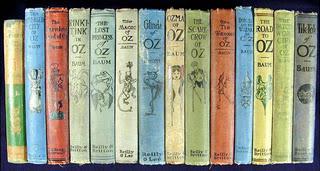
Set of the original Oz books by L. Frank Baum
Zack Ruskin: There’s a definite resurgence of folk tales being used assource material. What qualities of the “fairy tale” lend itself so naturally tobeing reinterpreted over and over again?Gregory Maguire: The traditional fairy tale is like a trunk that has beenhanded down through the generations. The lock is smashed, the interior compartmentis missing, the name painted on the top is illegible, the braces have beenreplaced three times and don’t match anything else. This is to say that thevery oldest tales very often betray, through missing bits and unmatchedsymbols, both evidence of their age and also an invitation to the inventivemind. I’ll give you an example. Why, in Cinderella, is her coach made from apumpkin? Why not a rutabaga, a bird’s nest, a scuttle of coal, a lemon meringuepie? There is probably an answer—some storyteller in a North European farmsteadhad a big pumpkin on the hearth that night, and the image held. But why, then,glass slippers? Glass slippers have nothing to do with farming life. And theyhave nothing to do with the story, I mean, that they are glass—except perhapsthat they are unique, one of a kind (so when the Prince brings out one slipperand Cinderella its match, she proves in her grime and lowliness to be thesplendid woman he fell in love with.) But why not slippers made ofhummingbird’s wings? Of pumpkin rinds? The facts of those inconsistenciesbetween images, of the unexplained reasons for why things are as they are,provide the handholds and the openings for a writer wanting to work with thematerial. Then again, fairy tales come with their built-in audience. Much moreappealing to the reader browsing in the library or bookstore to pick up a booktelling secrets about Cinderella than to risk spending time and money on astory about Pizzarina, the crusty daughter of the wizard’s pizza chef.
Zack Ruskin: Did the smash success of the Broadway adaptation of Wickedhave any bearing on your choice to revisit the Wicked saga? Have you a found a new audience of readersfrom fans of the musical?
Gregory Maguire: In a word, yes. Wicked had sold three quarters of a millioncopies before the play opened, and a few years later it had sold four timesthat amount. (The Wicked Years sequence has sold 7.5 million copies worldwideto date.) With the surge in readership came a surge in reader mail, and thebarrage of questions from readers who wanted to know more became a force I hadto deflect or drown under.
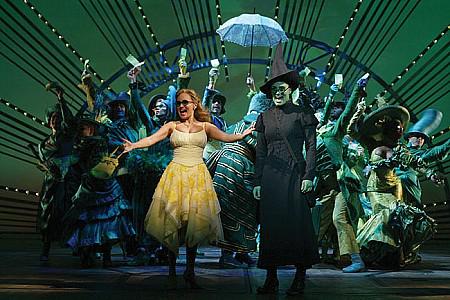
Still from the Broadway musical adaption of Wicked
Zack Ruskin: With the final book in the Wicked Series now behind you,what’s coming next? More novels in the vein of stand-alone titles like Mirror,Mirror and Lost?Gregory Maguire: I am not sure. Any ideas? Maybe it is time for Pizzarina…
Zack Ruskin: Your stories tend to be rich in story, dark in subjectand wholly original. Are there certain elements or traits to your storytellingthat you make a conscious effort to include, or are the themes of your workmore organic in nature?
Gregory Maguire: I love fantasy novels. My favorite is T. H. White’s The Once and Future King, the retelling of the King Arthur cycle that inspired themusical “Camelot.” What I loved best about that erudite work is that it waspoetic, comic, romantic, adventurous, magical, without ever losing sight ofbeing morally serious. Indeed, without that final component, I would never findmyself much interested in all the rest. So I try to make sure to pose a moralquestion to myself in the writing of a novel, even if readers never notice, orever seem to be able to put their finger on what it is that is motivating themto turn the pages. I believe the understanding that our choices haveconsequences, even in worlds in which magic has some sway, is the signal most importantelement to include in any novel.
Zack Ruskin: My new go-to question is to ask about the potential fora series to be rendered as graphic novels. Do you see your Wicked Years booksas potential candidates for that medium?
Gregory Maguire: Interesting you should ask that—I have just begun to readgraphic novels myself. Just this past weekend I finally read Chris Ware’smagnificent Jimmy Corrigan, and before that I read David Small’s Stitches,Craig Thompson’s Blankets, and I’m deep inside the wonderful Wonderstruck by BrianSelznick, which is part prose drama and part silent film on quickly turnedpages. So I will be tussling with your question quite a bit in the months tocome.
Zack Ruskin: You’ve stated before that the idea for Wicked came fromyour desire to explore the idea of whether people are truly ever inherentlyevil. Would say you’ve satisfied your curiosity on the subject?
Gregory Maguire: Do you mean have I come to a conclusion if people are evertruly inherently evil? No. But I have concluded, anecdotally, that I believethe roots of human demonstrations of evil—when they are individual andspecific, not cultural or institutional—lie deeply in something I would callself-hatred. I believe that the biological imperative not to kill or main one’sself runs so deeply (even if ultimately breachable) that self-disgust is thenturned outward, into contempt, into violence, into the dismissal of others asless than human, and therefore less deserving of justice, mercy, and tolerance.
Zack Ruskin: What, if any, elements of the classic 1939 film "The Wizardof Oz" influenced your Wicked Years series?
Gregory Maguire: I knew the film before I knew the books—I think this storyis the only one in my childhood (except maybe "Peter Pan") of which this can besaid. Well, I didn’t see much TV or many films as a child. But the film isstill under copyright so I had to tread carefully, evoking my Oz throughinference rather than direct quote. (No one can sing “Over the Rainbow” in theWicked Years, though I can and did suggest that Elphaba sing a song of longingthat dissolved like a rainbow after a storm… ) I found Judy Garland’s slightly gluey, over-earnest depiction of Dorothyboth attractive and a little off, and it was amusing to build on that for mydepiction of Dorothy in Out of Oz rather than in the far more sober andsomewhat humorless stout little Dorothy in the original novel.
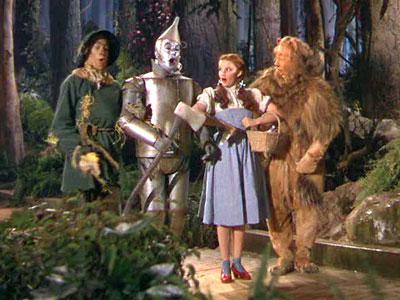
Still from the 1939 classic "The Wizard of Oz"
Zack Ruskin: When a reader finishes Out of Oz, what are you hopingthey’ve taken away from your series as a whole?Gregory Maguire: I think I could make a statement about the series on awhole, about its themes taken all together, like this: Most of us are notstuffed with extraordinary looks, gifts, powers; yet the world we have to livein requires extraordinary intervention. If we are not magically powerful, thenwe must find other ways to use our lesser powers to the good of the world, forif we do not, we are condemned to founder in darkness. Heroes and heroines(like Harry Potter, like Elphaba Thropp) can give us courage, but us lessmagnificent mortals must work together to make magic happen.
